Loading AI tools
Purported curse regarding the second term of U.S. presidents From Wikipedia, the free encyclopedia
The second-term curse is the perceived tendency of second terms of U.S. presidents to be less successful than their first terms.[1][2]
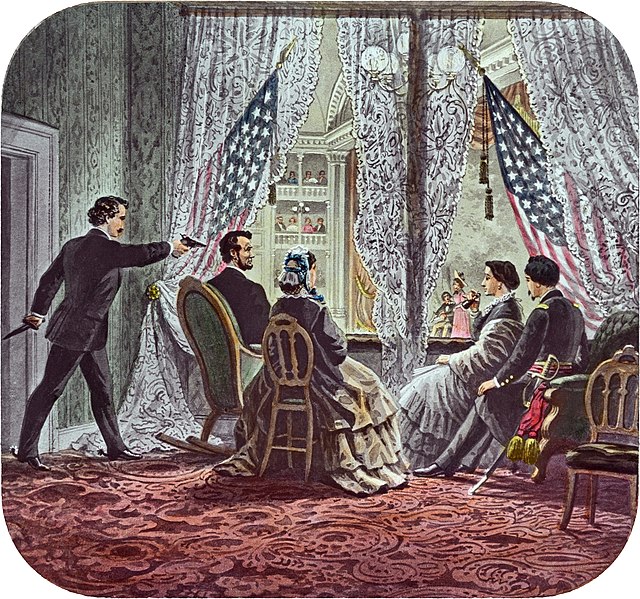
According to the curse, the second terms of U.S. presidents have usually been plagued by a major scandal, policy inertia, some sort of catastrophe, or other problems.[3][4][5] There have been twenty-one U.S. presidents who have served a second term,[6] each of whom has faced difficulties attributed to the curse[citation needed]. The legend behind the second-term curse is that after Franklin D. Roosevelt broke the de facto second term limit by running for third and fourth terms, the ghost of George Washington might have put a curse on any president who seeks a second term.[4][5] This legend notwithstanding, several presidents who served prior to this, including Washington and Roosevelt themselves, were plagued by problems in their second term more serious than in their first.[2]
Whether this perceived tendency is real is a subject of dispute: for example, political statistician Nate Silver, after analyzing presidential approval ratings for Harry S. Truman through Barack Obama, did find that approval ratings were lower on average during second terms, but he also found a variety of other reasons to explain those ratings, such as regression toward the mean, and he concluded that "the idea of the second-term curse is sloppy as an analytical concept".[7] In addition, political writer Michael Barone cited several presidents who had successful second terms, and wrote that "second-term problems resulted more often from the failure to adjust to changed circumstances and unanticipated challenges".[2] Conversely, a 2013 report in The Economist has said that the existence of the second-term curse is supported by data. The report stated that each of the eleven second terms served from the beginning of the Theodore Roosevelt administration to the end of the George W. Bush administration were less economically prosperous than their respective president's first term, save for the second terms of Truman, Ronald Reagan, and Bill Clinton.[8] However, these findings could be due to the effect of survivorship bias; presidents who are elected for a second term are more likely to have had a good first term, making their second term look worse by comparison.
| President | Second term | Attributed event(s) | |
|---|---|---|---|
 |
George Washington | 1793–1797 | Ramifications of the French Revolutionary Wars[2] Controversy over his signing of the Jay Treaty[1] Fatigue due to political infighting[9] |
 |
Thomas Jefferson | 1805–1809 | Burr conspiracy[6] Embargo Act of 1807[2] |
 |
James Madison | 1813–1817 | Burning of Washington[2] |
 |
James Monroe | 1821–1825 | Congressional rejection of his anti-slavery efforts[6] |
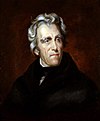 |
Andrew Jackson | 1833–1837 | Events in the Bank War which laid the groundwork for the Panic of 1837[10] |
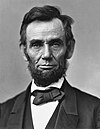 |
Abraham Lincoln | 1865 | His assassination[11] |
 |
Ulysses S. Grant | 1873–1877 | Panic of 1873[6] Failure of his Reconstruction efforts to uphold the rights of Southern African-Americans[2] Numerous scandals[9] |
 |
Grover Cleveland | 1893–1897[note 1] | Personal struggles with oral cancer[11] Panic of 1893[6] |
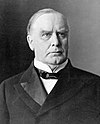 |
William McKinley | 1901 | His assassination[2] |
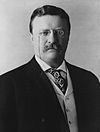 |
Theodore Roosevelt | 1905–1909[note 2] | The U.S. economy was not as strong as it was during his first term[8] |
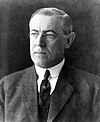 |
Woodrow Wilson | 1917–1921 | U.S. entry into World War I[2] Unpopularity stemming from his refusal to accept reservations to the Treaty of Versailles,[2] leading to the Senate's rejection of the treaty Failure to get the U.S. to join the League of Nations[9] Suffered a stroke[9] Controversy over the Espionage Act of 1917 and the Sedition Act of 1918 The U.S. economy was not as strong as it was during his first term[8] |
 |
Calvin Coolidge | 1925–1929[note 2] | The U.S. economy was not as strong as it was during his first term[8] |
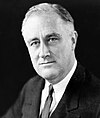 |
Franklin D. Roosevelt | 1937–1941 | Failure of the "court-packing plan"[1] The U.S. economy was not as strong as it was during his first term[8] |
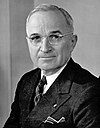 |
Harry S. Truman | 1949–1953[note 2] | Korean War[12] Controversy over his relief of General Douglas MacArthur[13] |
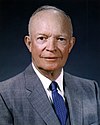 |
Dwight D. Eisenhower | 1957–1961 | Overcoat scandal[1] 1960 U-2 incident[1][5] The U.S. economy was not as strong as it was during his first term[8] |
 |
Lyndon B. Johnson | 1965–1969[note 2] | Vietnam War[12] Reaction to the Great Society[12] Urban riots and the Kerner Commission[12] Loss of Wisconsin primary to Eugene McCarthy[6] The U.S. economy was not as strong as it was during his first term[8] |
 |
Richard Nixon | 1973–1974[note 3] | Watergate scandal and subsequent resignation[4][12] The U.S. economy was not as strong as it was during his first term[8] |
 |
Ronald Reagan | 1985–1989 | Iran–Contra affair[1][4] |
 |
Bill Clinton | 1997–2001 | Paula Jones lawsuit[7] Lewinsky scandal and subsequent impeachment[1][4] Pardon controversy[14] |
 |
George W. Bush | 2005–2009 | Failure of Social Security reform[3] Hurricane Katrina[15] Indictment of Scooter Libby during the Plame affair[13] Financial crisis of 2007–2008[16] |
 |
Barack Obama | 2013–2017 | Edward Snowden leaks[14] United States federal government shutdown of 2013[11] IRS targeting controversy[17] David Petraeus' affair and guilty plea[18] Failed Supreme Court nomination of Merrick Garland.[19] |
Seamless Wikipedia browsing. On steroids.
Every time you click a link to Wikipedia, Wiktionary or Wikiquote in your browser's search results, it will show the modern Wikiwand interface.
Wikiwand extension is a five stars, simple, with minimum permission required to keep your browsing private, safe and transparent.